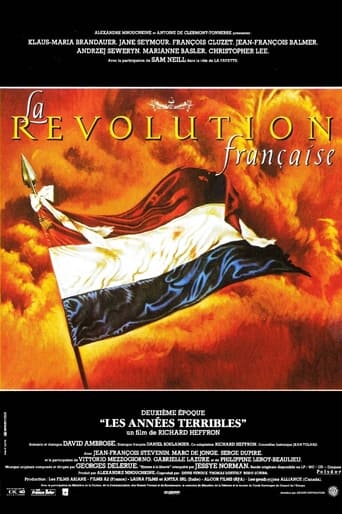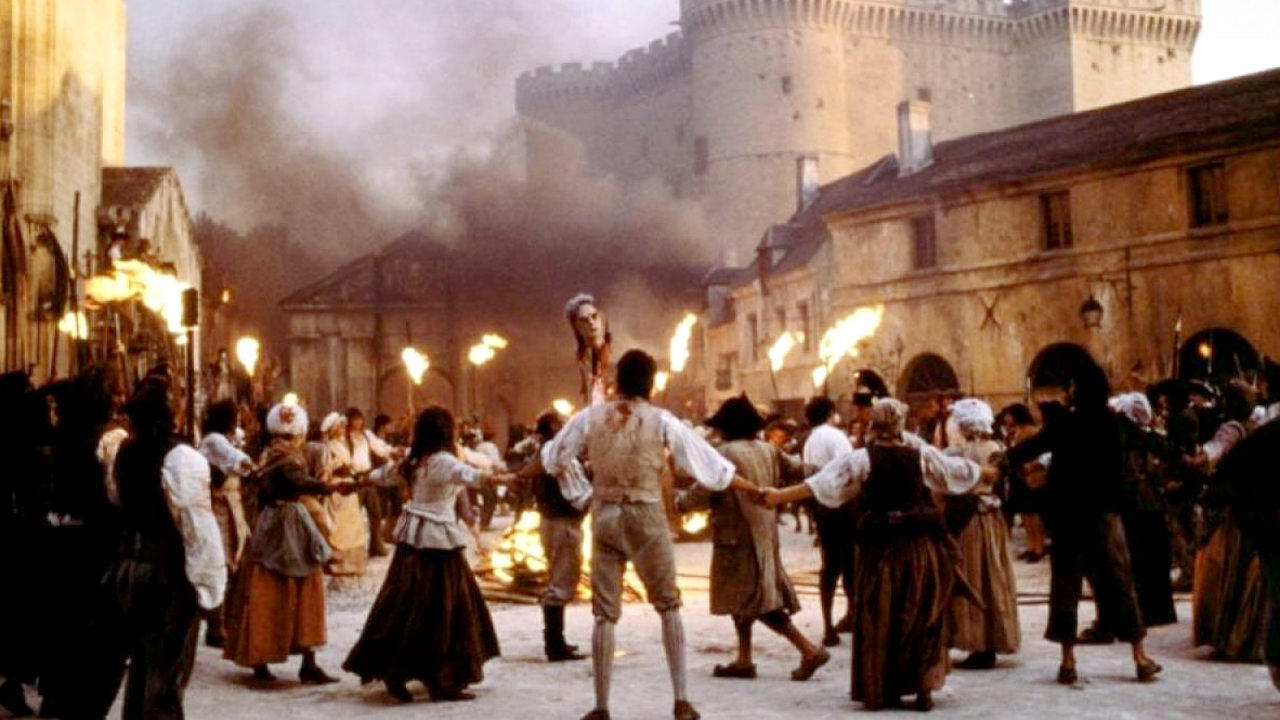denis888
La Révolution française is an outstanding piece of cinema. Made with high budget and awesome cast of world-level stars, this is an incredible depiction of deeply tragic events of French Revolution of the 18th Century.
Some critics pointed, however, that the film suffered from its neutrality, which resulted in a lack of point of view and in some incoherence. The first part, which dealt with a rather complex historical subject, was also criticized for its disjointed pacing. The second part was considered more gripping and dramatic. Jean-François Balmer received great praise for his portrayal of a rather sympathetic Louis XVI, and Andrzej Seweryn was considered very convincing as Robespierre.
I can only add that this is a Must see and a real severe warning to all of all - revolution is evel, with a Capital E, and it leads only to deaths, suffering, blood, tears, pain, loss, desperation and tragedy.
t_atzmueller
I do have do admit: I was never very interested in the French Revolution when I was in high school, but only became intrigued with the topic in later life, when becoming interested in contemporary politics. If I'd have to recommend a film or series that what make a viewer interested in what happened during the Revolution, it would definitely be "La revolution franchaise".As for the actors: Brandauer does a superb job (as he almost always does), though is perhaps the least believable of the "protagonists", considering Dantons larger-than-life image. This Danton is a schemer, a manipulator but less of a "force of nature" (as Gerald Depardieu would portray him) and more of an opportunistic snake. Francois Cluzet does a fine job as Desmoulins, comes across as almost too blue-eyed, but the scenes are invariably stolen by Andrzej Seweryn as humanist-cum-fascist Robespierre, who plays the character as humanely perceptive as I've ever seen in a film about the topic.Further credit must go to Balmer and Seymour as the doomed royal couple. Especially Balmer as King Louis XVI shows us a very accurate portrayal of a weak, undecided monarch; a yea-sayer, who merely drifts with the tide of time that will eventually sweep him under the guillotine. Sir Christopher Lee, who has a very small part as executioner Henri Sanson (a very interesting and multi-faceted character in his own right), responsible for the beheading of almost all major protagonists. Lee plays the character as a stern, dutiful man who, shown only through nuances and facial expression, has yet retained his humanity, basic compassion, even a disdain for the latter wave of "The Terror" that kept him busy for month at end. Indeed, one would almost have hoped for a "spin-off" which focuses entirely on the "Monsieur de Paris". Another testament to one of the most brilliant actors of our times.The settings, from the grandeur of Versailles to the filth of the Parisian streets are completely convincing, even more so than recent films like, for example, "The Perfume".One of the strongest aspects of the film: despite being filmed for an anniversary of the revolution, it doesn't glorify or portray the events and those involved in a heroic light. Quiet the opposite: the protagonists are all shown to be either naïve (Desmoulins), opportunistic (Danton) or generally, yet very humanly flawed and/or fanatic (Robespierre, Hebert, Saint-Just, et al). The French mob is shown as what it was: simply a mob and it comes as no big surprise that in many places the French word for "people" ("La Peuple") has since become an insult, directed at the unwashed majority, easily lolled by demagogues, carrying only to fill their bellies (be it with bread or, so it would seem, more often with liquor), driven mainly by the disdain for those whom they (often quiet rightly) conceive as something better than themselves.If anything, the film is a reflection of more contemporary, even current politics, be it democracy, where the "Peuble" is generally bought by the highest bidding politician, communism with it's stubborn ideology or fascism, where the loudest demagogue captures the hearts and minds of people (if not to say: poisons them).If I'd have to recommend any film or TV-Series on the French Revolution, this would be the one. Coming in at almost six hours, the four parts never seem long or boring. Quiet the opposite. At the end of the run, one is almost saddened that one has to leave those fascinating times and people (well, granted of course, that 90 percent of them have lost their heads by the time the credits play anyway).A deserved 8 from 10.
ymatusevich
This is absolutely the best film on French revolution, and maybe on any revolution. Unfortunately, it is very hard to find, very very hard. I have been trying for years. A must. Brandauer is absolutely believable and stunning. He is my favorite actor anyway and he is, by far, the best Danton, although I do love Depardieu's performance. I saw this film ten years ago in France and still cannot forget it. Since then I have been trying to purchase it for my classes and for my students and have been unsuccessful so far. They keep it like a big secret. I never understood why. Maybe because the revolution was shown in its true colors? Even in France this film is not shown very often, hard to find and not known enough. The dialogs are fantastic, all acting fabulous. Highly recommended.
Rosabel
I loved this film, both the English and French versions! The detail was astounding, and the film managed to tell this complicated story without dropping any threads. Jean-Francois Balmer is touching as the hapless Louis XVI, a well-meaning but out-of-touch ruler totally out of his depth in the political and social upheaval that was to destroy him. The three main revolutionaries, Desmoulins, Danton and Robespierre are shown as genuine human beings with emotional ties to each other, but who start going their separate paths, at a time when disagreement leads not to estrangement but to death. The film is divided into 2 halves, "The Years of Light", describing the political changes taking place in France as the revolution approaches, and "The Years of Terror", beginning with the arrest of the King and proceeding through the Terror through to the death of Robespierre. The second half is better, with more action and suspense, as familiar characters become swept up in the destruction and insanity of a Revolution going out of control. Andrej Seweryn is superb as the cool tyrant sending his enemies and their families to their bloody deaths, while gently describing his view of the world as one governed by a spirit of goodness and virtue. His sudden fall from power in the National Assembly is spellbinding, and the movie roars to a conclusion as the first of the revolutionaries becomes the last victim of the guillotine. The only jarring performance in this film is that of Peter Ustinov in the first half, who tends to play himself rather than the great moderate, Mirabeau. The rest of the international cast is wonderful.


 AD
AD


